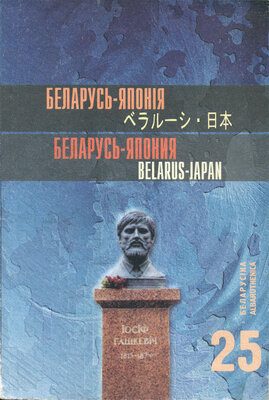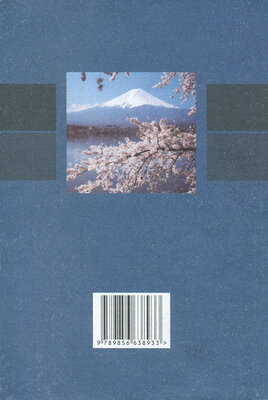Беларусь-Японія
Матэрыялы Другіх міжнар. чытанняў, прысвечаных памяці Іосіфа Гашкевіча
Выдавец: Беларускі кнігазбор
Памер: 400с.
Мінск 2003
A peculiarity of loanwords in Japanese is that they are marked in speech (by using some sounds and combinations that are not inherent to the language such as TI or FI), and even more obviously in writing — by a special script katakana that is, with certain exceptions, dedicated to loanwords. Like most other world languages, and unlike Japanese, Belorussian has only one script for all lexicon irrespective of its origin, and though loanwords may be occasionally marked by uncommon sounds or their combinations (and orthographies), the foreign origin of a word is rarely evident. (Exceptions are words with f like fakt ‘fact’ or funt ‘pound’, words starting with e like epoha ‘epoch’, and some others).
Interestingly, both Belorussian and Japanese languages are also similar in that loanwords undergo substantial transformations related to phonetics and orthography of the recipient language. Main reasons in Japanese are indiscrimination between 1 and r (ron ‘loan’ or dira ‘dealer’), substituting v with b (rabu ‘love’ or boruteji ‘voltage’), impossibility of consonant clusters and consonants
not followed by a vowel except for syllabic n (sukuriputo ‘script’), and others. With Byelorussian, the main reason behind «corruption» of loanwords is transformation of о into a in unaccented syllables such as piyanier ‘pioneer’, narmal’nyj ‘normal’, palimer ‘polymer’, or matacykl ‘motorcycle’. Particularly, this can bring out problems with proper names: with the both languages, it may be very difficult, or impossible, to reconstruct the original form of a foreign name.
Speaking about language contact, there is hardly and direct relation between Japanese and Belorussian while Japanese-Russian contact features a long history. At the same time, there are some loans shared by Japanese and Belorussian, but not Russian. Examples are German words Zettel and Gewalt that have been borrowed into Japanese and Belorussian asretteru, gebaruto and ceitlik, gvalt, respectively.
Obvious practical applications of comparative analysis between Japanese and Belorussian in terms of lexical borrowing are, first of all, foreign language acquisition and building of new terminologies. Though both subjects deserve a separate consideration, only a short outline is given below.
The problem of loanwords in learning a foreign language (primarily English) has been investigated quite extensively in case of Japanese. On the other hand, the Belorussian has made considerable progress in the field of foreign language teaching but loanwords do not seem to be treated seriously except for the so called «false friends of translator» («international words»). Thus, approaches worked out in Japan might be helpful. Such approaches imply, basically, two points. The first one is that loanwords being familiar to Japanese speakers are helpful to memorize original foreign words. In other words, any Japanese has a substantial stock of foreign (English) words, and only a minor correction in pronunciation is required to convert this stock into his active English vocabulary. The other point, however, suggests that many loans have been changed in sound and meaning in the course of the borrowing; thus, special warning should be made so that learners do not mix loanwords with the corresponding foreign words. The both points seem applicable to Belorussian as well.
Speaking of new terminologies, both languages face this problem as well as most other non-English speaking nations. Two competing strategies are possible here, namely, adopting foreign terms as they are, and coining new terms from native material. Both strategies have merits and drawbacks. The former features fast and effortless term-building while the latter, though requiring some effort, offers terms that are more inherent to the language and comprehensible to general public. Neither strategy can be considered as the ultimate solution, an adequate combined use of both seems practicable. In case of Belorussia, the process of building new national terminology of science and technology was hampered for ideological reasons under the Soviet regime, and now this problem is on the agenda again. Here, too, Belorussia might utilize Japanese experience.
EXEMPLARY ANALYSIS
Two dictionaries of loanwords, of approximately same scale, were employed for comparative analysis, Shin-Gairaigo Jiten1 and Slounik inszamounych slou2, (By the word, while Belorussian dictionaries of loanwords are very few in number, Japanese ones are abundant which is indicative of importance that is given to loanwords in the Japanese society. Particularly, a Japanese often has to look for a new loanword that pops out in mass media; otherwise, he may well fail to keep pace with life. Situation in Belorussia is not yet so much severe but times are changing.)
Taken for analysis were words beginning with «п», or in case of Japanese, with na, ni, nu, ne, and no kana symbols. The Belorussian dictionary offers 91 entries while its Japanese counterpart contains as many as 238 entries. This is because the former includes only well established words while the latter offers a lot of latest neologisms. In analysis, some kinds of entries were excluded from the Japanese dictionary such as proper words (NASA, Nippon Fund), names of medicines (nystatin, niballin), trade names (naturama), slang (nightrium, nudie), and phraseological units (knitted dress, n’est ce pas) while in case of the Belorussian dictionary, related adjectives were disregarded. Finally, 86 and 169 entries were selected, respectively.
Now let us consider some statistics that, although by no means being reliable (apart from many other reasons, Japanese dictionaries normally offer related words grouped in a single entry while Belorussian ones give them under separate entries), may give some interesting matter for reasoning.
In the Belorussian case, most loanwords are of Latin origin (34), then come words borrowed from Russian, including ones borrowed from various languages via Russian (16): Polish (10), Greek (8), French (7), Italian (3), German (2), Dutch (2), Turkic (2), English (1), and Spanish (1). The total of direct and indirect borrowings from Latin and Greek is as many as 52, that is, 60%. This is not surprising, because in Belorussian, like in other European languages, Latin and Greek have long been primary resources for building terminology of art, science, and technology. (This function in Japanese has been performed by Sino-Japanese vocabulary that is not normally treated in terms of loanwords).
The Japanese dictionary offers loanwords from English (123), German (21), French (16), Greek (3), Russian (2), Latin (1), Chinese (1), Korean (1) as well as one so called wasei-yogo, i.e. a Japanese coinage based up on foreign components. (This phenomenon, being unique to Japanese, deserves a separate consideration. See, for example3). The case in point is naita, one of most often cited
1 Shin-Gairaigo Jiten [New Dictionary of Loanwords], Tokyo, 1991.
2Булыка A. Слоўнік іншамоўных слоў. Мн.. 1993.
’ Баршай О. Иноязычные заимствования в японском языке. Минск, 1996; Barshay О. Wordbuilding in Japanese Using Loanwords. RO, 1995. L. 1. P. 137-139.
examples of wasei-yogo that was built from the English night and the suffix -er to denote a night game, mainly baseball.
It should be noted that the origin of many loanwords in Japanese is even more vague than in case of Belorussian; anyway, it is not uncommon that several dictionaries offer different etymologies for the same word. Thus, in the dictionary under consideration, the prefix non is designated as French while the words under this entry are more often of clearly English origin (as non-stop or nonsense), the word nihiru is designated as English while it is rather Latin nihil as most other dictionaries claim; the word norumu ‘norm’ is designated as Russian while it is obviously of French derivation (norme).
No matter how much unreliable our mini-statistics may be, it checks well with the established fact that the vast majority of loanwords in Japanese are of English derivation. (Or rather of American. In the dictionary, two entries are marked as American as in opposition to English. The first one is natto, being ‘not’ as pronounced in American way. The second one is nisei being the Japanese word for ‘second generation’; the word became popular in America to denote Americans born to Japanese parents, and then has been re-exported to Japan).
In closing, listed are some correlated loanwords from the two dictionaries that give a general idea how words of the same origin may be transformed in the two languages. As may be seen from the examples, most words of Latin derivation have been borrowed into Japanese through English while Belorussian has acquired the vocabulary via different routes (other European languages including Russian).
noberu nabigeta nokku-auto nokutan
nomin aru nomineshon
napamu nomaru nosutarija natoriumu
nechua nachurarizumu nachuraru
nafusa neshon nashonarizumu nashonaru negachibu
naviela navigator nakaut nakciurn naminal’ny naminacija napalm narmal’ny nastal’hija natryj natura naturalizm natural’ny nafuta nacyja nacyjanalizm nacyjanal’ny niegatyuny
‘novel’ ‘navigator’ ‘knockout’ ‘nocturne’ ‘nominal’ ‘nomination’ ‘napalm’ ‘normal’ ‘nostalgia’ ‘sodium’ ‘nature’ ‘naturalism’ ‘natural’ ‘naphtha’ ‘nation’ ‘nationalism’ ‘national’ ‘negative’
паігоп
niejlon
‘nylon’
nyuron
niejron
‘neuron’
nyutoraru
niejtral’ny
‘neutral’
nyutoron
niejtron
‘neutron’
nekutaru
niektar
‘nectar’
neon
nieon
‘neon’
nihirizumu
nigilizm
‘nihilism’
nikochin
nikacin
‘nicotine’
nansensu
nonsens
‘nonsense’
norumu, noruma
norma
‘norm’
noto
nota
‘note’
nohau
nou-hau
‘know-how’
nutoria
nutryja
‘nutria’
nyuansu
niuans
‘nuance’
Алег Баршай (Мінск Токіо)
Запазычаныя словы
ў беларускай і японскай мовах
Параўнальнае даследаванне
Лўтар супастаўляе розныя шляхі і формы запазычанняў у дзвюх аддаленых (геаграфічна і этнічна) мовах. У беларускай пераважаюць лацінізмы і грэцызмы, вялікае ўздзеянне — як пасрэднік — аказала руская мова. Японская ж найперш адчула англійскі ўплыў. У канцы прыводзяцца запазычанні на літару «н».
 КНІГІ ОНЛАЙН
КНІГІ ОНЛАЙН


